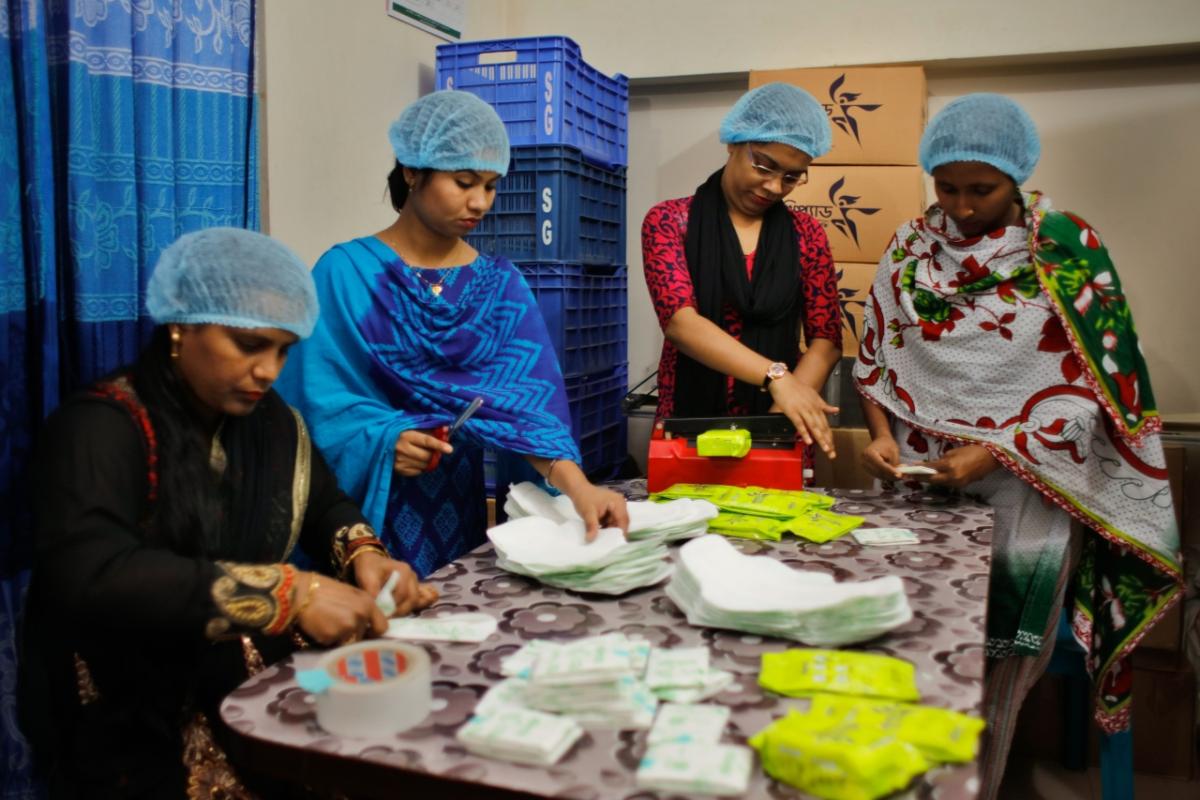Changing Habits Around Menstrual Hygiene in Bangladesh
Company Sokhipad is educating women and girls across Bangladesh about sanitary pads and creating a market for the traditionally taboo product

DHAKA, Bangladesh, June 19, 2020 /3BL Media/ – Menstrual hygiene manufacturer Sokhipad has joined Business Call to Action (BCtA) by pledging to create awareness about menstrual hygiene management among 100,000 low-income women throughout Bangladesh by 2021. The company also commits to delivering sanitary pads to 720,000 low-income women in Bangladesh by 2021.
Launched in 2008, BCtA aims to accelerate progress towards the Sustainable Development Goals (SDGs) by challenging companies to develop inclusive business models that engage people with less than USD 8 per day in purchasing power as consumers, producers, suppliers and distributors. It is supported by several international organizations and hosted by the United Nations Development Programme (UNDP).
In Bangladesh, awareness of and access to menstrual hygiene products is limited. A lack of information about effective menstrual hygiene management among low-income communities keeps women and girls from buying sanitary pads. Even where awareness does exist, the long-standing social taboo on sanitary pads in Bangladesh makes it difficult for women to buy them from shops, where the seller is usually a man.
Awareness of safe and sanitary menstrual hygiene practices and access to affordable menstrual hygiene products gives women the dignity to become active and productive members of society. Bangladeshi company Sokhipad is empowering women and girls through its innovative sanitary pad awareness-raising and delivery efforts.
Sokhipad’s inclusive business model is innovative in two ways. Firstly, rather than advertising for their product, Sokhipad reaches its target customers through community awareness campaigns, leading to lower costs for the company and, more importantly, generating universal demand for an important health product regardless of brand. Secondly, Sokhipad sanitary pads are delivered directly to the customers’ hands through home visits, parent meetings at school, meetings of women in the village known as uthan boithoks, and elsewhere.
“Sokhipad has created a simple and low-cost women’s hygiene solution that has the potential to change the lives of women across Bangladesh,” said Luciana Aguiar, Head of Business Call to Action. “This model not only ensures that women understand the importance of menstrual hygiene management and the benefits of sanitary pads, but also provides a safe and comfortable space for women to access them. We commend Sokhipad’s commitment to women’s empowerment.”
The company has established partnerships with leading NGOs in the country. These NGOs have field staff in all 64 districts of Bangladesh. Sokhipad follows a Training of Trainer (ToT) model meaning it provides training to these field staff who then conduct awareness activities in their respective regions. These workers also act as sales agents for Sokhipad and receive a commission for every package of Sokhipad sold.
Sokhipad’s CEO Muhammad Ariful Forquan noted, “Using sanitary pads is a longstanding taboo in Bangladeshi society. With time, the economically advantaged have risen above this taboo, but the economically disadvantaged all too often still use unhygienic solutions like rags. By selling low-cost pads and running awareness campaigns, Sokhipad is increasing the uptake of sanitary pad use, contributing to better health of women and positively impacting SDG 3 (Health), SDG 5 (Gender Equality) and SDG 6 (Water & Sanitation) in the process.”
For further information:
BCtA: bcta@undp.org
Sokhipad: Muhammad Ariful Forquan at ecotrading24@gmail.com
BctA membership does not constitute a partnership with its funding and programme partners, UNDP or any UN agency.
About Business Call to Action (BCtA): Launched at the United Nations in 2008, BCtA aims to accelerate progress towards the Sustainable Development Goals (SDGs) by challenging companies to develop inclusive business models that offer the potential for both commercial success and development impact. BCtA is a unique multilateral alliance between key donor governments including the Dutch Ministry of Foreign Affairs, Swedish International Development Cooperation Agency (Sida), UK Department for International Development, US Agency for International Development, and the Ministry of Foreign Affairs of the Government of Finland, and the United Nations Development Programme — which hosts the secretariat. For more information, please visit www.businesscalltoaction.org or on Twitter at @BCtAInitiative.
About Sokhipad: Sokhipad is a social business venture with a vision to facilitate affordable and quality sanitary napkins among schoolgirls and working women across Bangladesh. Through its innovate inclusive business model, Sokhipad is raising awareness of menstrual hygiene management in Bangladesh.
